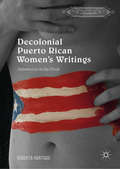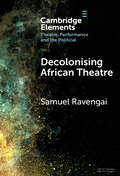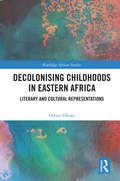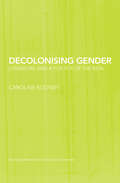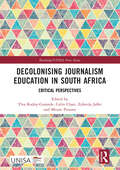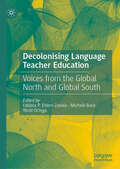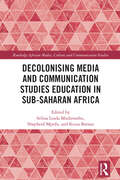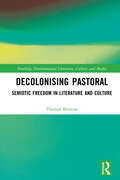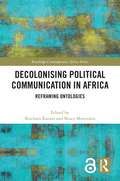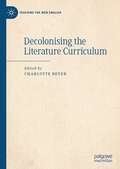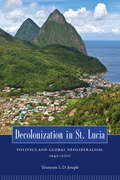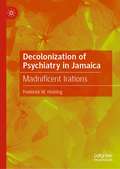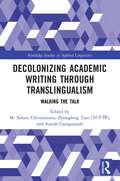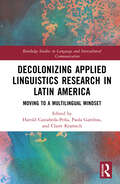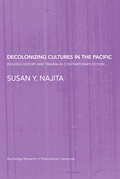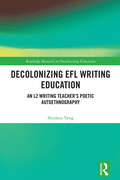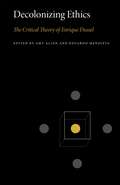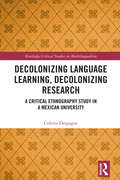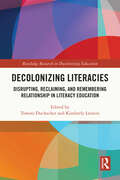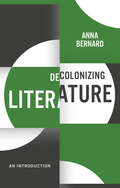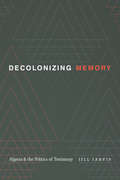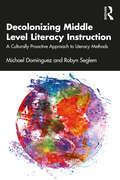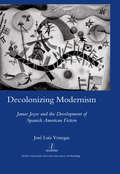- Table View
- List View
Decolonial Puerto Rican Women's Writings: Subversion in the Flesh (Literatures of the Americas)
by Roberta HurtadoThis book explores representations of sentient-flesh — flesh that holds consciousness of being — in Puerto Rican women’s literature. It considers how different literary devices can participate in the decolonization of the flesh as it is obfuscated by mappings of the 'body' from the Enlightenment era and colonial endeavors. Drawing on studies of cognitive development and epigenetics to identify how sentient-flesh creates knowledge of power and navigates methods of subversion for social justice, this book grapples with the question of how Puerto Rican women, living in the nation of their colonizer, manifest an identity that exists beyond the scope of colonization. It makes the case for a change in perspective that illustrates the conceptual shift from survivors to thrivers to educators. To do so, it draws upon Cherríe Moraga and Gloria Anzaldúa’s theory in the flesh; Iris Lopez’s theories of trauma-knowledge; and María Lugones’s concept of 'world travelers' to retain the corporeal flesh and physical location in Latinas’ attempts to write subversion under U.S. colonization across racial, cultural, and ethnic boundaries, as well as the gendered-sexuality barriers identified by Emma Pérez. This project builds on their work to frame Latina literature within a new discussion of how corporeal, memory, and sentient experiences of identity must center sentient-flesh as the source of decolonial consciousness rather than relapsing into discourses of the 'body'.
Decolonising African Theatre (Elements in Theatre, Performance and the Political)
by Samuel RavengaiDecolonisation can be pursued in different ways. After many years of developing a critical language to engage coloniality, the most urgent need in African theatre is to develop new theories and methods in our manufactories. This Element uses Afroscenology as a theory to read and comment on African theatre. The Element particularly focuses on the history of laboratories in which it was tested and emerged, the historicization of rombic theatre and the crafting of a theory of the playtext which has been named theatric theory to distinguish it from the Aristotelian dramatic theory. The second dimension of the theory is the performatic technique. This Element also explain Afrosonic mime through examples drawn from the workshops conducted in training performers.
Decolonising Childhoods in Eastern Africa: Literary and Cultural Representations (Routledge African Studies)
by Oduor OburaThis book deconstructs Eurocentric narratives and showcases local voices to re-examine childhood in Eastern Africa. Moving away from portrayals of eastern African childhood as characterised by want, the author argues for a differentiated and pluralist nature of the eastern African childhood. Taking a chronological approach, the author provides a multidisciplinary critical reading of Africanist research on childhood in eastern Africa, drawing from anthropological and cultural studies, while examining writings from the pre-imperial and colonial periods. Moving into the contemporary period, the book reveals the continuity, tensions and ruptures of these portrayals in humanitarian, legal, and journalistic discourses, before exploring postcolonial writings on childhood in works by Eastern African novelists. Based on such a multidisciplinary perspective, this book will be of interest to scholars of African literature, eastern African history, critical childhood studies, museums and Africanist epistemologies.
Decolonising English Studies from the Semi-Periphery
by Ana Cristina MendesThis book investigates how decolonising the curriculum might work in English studies — one of the fields that bears the most robust traces of its imperial and colonial roots — from the perspective of the semi-periphery of the academic world- system. It takes the University of Lisbon as a point of departure to explore broader questions of how the field can be rethought from within, through Anglophone (post)coloniality and an institutional location in a department of English, while also considering forces from without, as the arguments in this book issue from a specific, liminal positionality outside the Anglosphere. The first half of the book examines the critical practice of and the political push for decolonising the university and the curriculum, advancing existing scholarship with this focus on semi-peripheral perspectives. The second half comprises two theoretically-informed and classroom-oriented case studies of adaptation of the literary canon, a part of model syllabi that are designed to raise awareness of and encourage an understanding of a global, pluriversal literary history.
Decolonising Gender: Literature and a Poetics of the Real (Routledge Research in Postcolonial Literatures)
by Caroline RooneyThrough examination of the functions of language and cross-cultural readings of literature – from African queer reading to postcolonial Shakespeare – Rooney explores the nature of the real, providing: a way out of some of the current deadlocks of feminist theory an anti-essentialist approach to gender in which both male and female readers may address a consciousness of the feminine a platform for postcolonial and postmodernist thinkers to engage in a dialogue around the status of the performative in regard to the other a new theory of poetic realism in both canonical and postcolonial literatures a re-reading of the Enlightenment legacy in terms of postcolonial liberation theory a comparison of contemporary debates on the real across the humanities and the sciences. Exploring current ideas of performativity in literature and language, and negotiating a path between feminist theory’s common pitfalls of essentialism and constructivism, Caroline Rooney argues convincingly that by rethinking our understanding of gender we might also equip ourselves to resist racism and totalitarianism more effectively.
Decolonising Journalism Education in South Africa: Critical Perspectives (Routledge/UNISA Press Series)
by Colin Chasi Ylva Rodny-Gumede Zubeida Jaffer Mvuso PononoThis book is the culmination of several years of collaborative work. It is a unique contribution to the field of journalism because of the depth and variety of contributions it makes to the field. The scholars who contribute to this volume respond to the great need to rethink journalism from various perspectives including journalism training, research, the contents of the news media, language, media ethics, the safety of journalists and gender inequities in the news media. In doing this, they recognise how the societies that journalism address should themselves change.
Decolonising Language Teacher Education: Voices from the Global North and Global South
by Michele Back Fabiola P. Ehlers-Zavala Yecid OrtegaThis edited book examines decolonization in applied linguistics, focusing on language teacher preparation across the Global North and South. It brings together diverse voices to challenge colonial legacies and promote more just, inclusive, and locally grounded approaches to education. Organized into three sections—challenges, programs, and strategies—the volume first explores systemic barriers that continue to shape language education. It then highlights successful models from varied global contexts, including Southeast Asia, Europe, and the Americas, that reimagine language teacher preparation through critical pedagogy, translanguaging, and community collaboration. The final section offers practical strategies for future action, such as the ethical use of technology to empower marginalized voices in the classroom. With key themes of decolonization, applied linguistics, language teacher education, social justice, and Global North–Global South collaboration, this collection provides essential insights for educators, researchers, and policymakers seeking to reshape language teaching in more equitable and culturally responsive ways.
Decolonising Media and Communication Studies Education in Sub-Saharan Africa (Routledge African Media, Culture and Communication Studies)
by Shepherd Mpofu Selina Linda Mudavanhu Kezia BatisaiThe book provides insights on decolonising media and communication studies education from diverse African scholars at different stages of their careers. These academics, located on the continent and in the diaspora, share an interest in decolonising higher education broadly and media and communication studies teaching and learning in particular. Although many African countries gained flag independence from different European colonial powers between the 1950s and the 1970s, this book argues that former colonies remain ensnared in a colonial power matrix. Many African universities did not jettison ways of teaching and learning established during colonialism, and even those journalism, communication, and media studies training programmes which were established after the attainment of flag independence did not place decolonial agendas at the front and centre when setting them up. Starting with big picture thematic questions around decolonisation, the book goes on to consider what the implications of change would be for students and instructors, before reflecting on how far it is possible to decolonise curricula and syllabi and what this might look like in practice across a range of subject areas and country contexts. Overall, this book presents a nuanced picture of what a decolonised media and communication studies education could look like in sub-Saharan Africa. This book is essential for researchers in Africa in disciplines such as media and communication studies, journalism, film studies, cultural studies, and higher education studies. More broadly, the concepts and ideas on decolonising teaching and learning discussed in the book are relevant to instructors in any discipline who are interested in doing the decolonial work of contesting coloniality.
Decolonising Pastoral: Semiotic Freedom in Literature and Culture (Routledge Environmental Literature, Culture and Media)
by Thomas BristowThis book offers an interdisciplinary exploration of pastoral, a genre that has captured the Western imagination for centuries, across literature, art and music. Combining the practices of literary criticism and creative writing, Decolonising Pastoral develops a new series of tools for the project of the environmental humanities. With an emphasis on subjectivity and experience, essays and fictocriticism are woven with scholarship and stories to create a fresh critical framework. Six chapters focus on laying out a new synthetic methodology, taking readers on a journey across literary genres, forms and modes, to explore nature both as an organic totality that encompasses mind and matter, and as a source of cultural expression and production. Beginning with an introduction to biosemiotics, the text progresses onto the blue humanities, synthetic criticism and metrics for decolonising pastoral, before uniting the threads together. It discusses works from diverse writers such as Thea Astley, Judith Wright, Ted Banfield, Xavier Herbert, Alexis Wright, Sylvia Plath, T.S. Eliot, Seamus Heaney, W.H. Auden, Percy Bysshe Shelley, William Wordsworth, William Blake, John Milton and William Shakespeare.This ambitious and experimental methodology, developing where creative writing and literary criticism meet, will be an important read for scholars, researchers and students interested in literature, ecology, environmental studies and language.
Decolonising Political Communication in Africa: Reframing Ontologies (Routledge Contemporary Africa)
by Bruce Mutsvairo Beschara KaramThis book uses decolonisation as a lens to interrogate political communication styles, performance, and practice in Africa and the diaspora. The book interrogates the theory and practice of political communication, using decolonial research methods to begin a process of self-reflexivity and the creation of a new approach to knowledge production about African political communication. In doing so, it explores political communication approaches that might until recently have been considered subversive or dissident: forms of political communication that served to challenge imposed western norms and to empower African citizens and their histories. Centring African scholarship, the book draws on case studies from across the continent, including Zimbabwe, South Africa, Nigeria and Ghana. This book will be of interest to students and scholars of politics, media and communication in Africa.
Decolonising the Literature Curriculum (Teaching the New English)
by Charlotte BeyerThis book explores pedagogical approaches to decolonising the literature curriculum through a range of practical and theoretically-informed case studies. Although decolonising the curriculum has been widely discussed in the academe and the media, sustained examinations of pedagogies involved in decolonising the literature at university level are still lacking in English and related subjects. This book makes a crucial contribution to these evolving discussions, presenting current and critically engaged pedagogical scholarship on decolonising the literature curriculum. Offering a broad spectrum of accessible chapters authored by experienced national and international academics, the book is structured into two parts, Texts and Contexts, presenting case studies on decolonising the literature curriculum which range from the undergraduate classroom, university writing centres, through to the literary doctorate.
Decolonization in St. Lucia: Politics and Global Neoliberalism, 1945–2010 (Caribbean Studies Series)
by Tennyson S. JosephTennyson S. D. Joseph builds upon current research on the anticolonial and nationalist experience in the Caribbean. He explores the impact of global transformation upon the independent experience of St. Lucia and argues that the island's formal decolonization roughly coincided with the period of the rise of global neoliberalism hegemony. Consequently, the concept of “limited sovereignty” became the defining feature of St. Lucia's understanding of the possibilities of independence. Central to the analysis is the tension between the role of the state as a facilitator of domestic aspirations on one hand and a facilitator of global capital on the other. Joseph examines six critical phases in the St. Lucian experience. The first is 1940 to 1970, when the early nationalist movement gradually occupied state power within a framework of limited self-government. The second period is 1970 to 1982 during which formal independence was attained and an attempt at socialist-oriented radical nationalism was pursued by the St. Lucia Labor Party. The third distinctive period was the period of neoliberal hegemony, 1982-1990. The fourth period (1990-1997) witnessed a heightened process of neoliberal adjustment in global trade which destroyed the banana industry and transformed the domestic political economy. A later period (1997-2006) involved the SLP's return to political power, resulting in tensions between an earlier radicalism and a new and contradictory accommodation to global neoliberalism. The final period (2006-2010) coincides with the onset of a crisis in global neoliberalism during which a series of domestic conflicts reflected the contradictions of the dominant understanding of sovereignty in narrow, materialist terms at the expense of its wider anti-systematic, progressive, and emancipator connotations.
Decolonization of Psychiatry in Jamaica: Madnificent Irations
by Frederick W. HicklingThis book traces the historical postcolonial journey of four generations of Jamaican psychiatrists challenging the European colonial ‘civilizing mission’ of psychiatric care. It details the process of deinstitutionizing patients with chronic mental illness using psychohistoriographic cultural therapy, by engaging them in creating sociodrama and poetry writing, not only to express and reverse the stigma contributing to their marginalized status, but also to reconnect them to a centuries-long history of oppression. The author thereby demonstrates that psychological decolonization requires a seminal understanding of the complex mental inter-relationship between slaves and slaveowners. Further, it is shown how the model analyzes the antipodal dialectic history of descendants of Africans enslaved in the New World by brutish British Imperialists suffering from the European psychosis of white supremacy. Drawing together a detailed description of the sociopoem Madnificent Irations, with an examination of Jamaica’s political and social history, and the author’s personal experience, this compelling work marks an important contribution to decolonial literature. It will be of particular interest to students and scholars of postcolonial studies, critical race theory, the history of psychology and community psychology.
Decolonizing Academic Writing through Translingualism: Walking the Talk (Routledge Studies in Applied Linguistics)
by Suresh Canagarajah M. Sidury Christiansen Tian 田中锋 ZhongfengThis collection explores innovative ways to embody translingual practices in academic writing, showcasing how multilingual authors can effectively leverage their linguistic resources in research and publication. Recognizing that traditional academic writing often suppresses multilingual voices, this book advocates for a decolonized approach that embraces diverse linguistic expressions and knowledge representations for social change.This volume features perspectives from scholars across various disciplines and linguistic backgrounds presenting their unique visions of discursive, rhetorical, and linguistic diversity in academic writing. Each chapter showcases its respective author’s critical reflections on their language choices. This book offers a counterpoint to existing literature by making the case for the register known as “academic English” as a form both open to change and possible for accommodating diversity, empowering scholars to negotiate the register’s norms around their own languages and establish spaces for their own unique voices and identities.This book serves as a valuable resource for graduate students, faculty, and scholars interested in academic writing, TESOL, composition studies, language teaching and learning, and applied linguistics.
Decolonizing Applied Linguistics Research in Latin America: Moving to a Multilingual Mindset (Routledge Studies in Language and Intercultural Communication)
by Claire Kramsch Harold Castañeda-Peña Paola GamboaThis collection explores the critical decolonial practices of applied linguistics researchers from Latin America and the Latin American diaspora, shedding light on the processes of epistemological decolonization and moving from a monolingual to a multilingual stance. The volume brings together participants from an AILA 2021 symposium, in which researchers reflected on applied linguistics in Latin America, and on the ways in which it brought concerns around social justice, the legacy of coloniality, and the role of monolingual English in education to the fore. Each chapter is composed of four parts: an autobiographical section written both in Spanish or Portuguese and in English followed by a reflection on the epistemological differences between versions; a discussion in English of the research project; a critical reflection on the epistemic practices and critical pedagogies enacted in the project; and the author(s)’ understanding of the concept of decolonization and recommendations for further decolonizing the monolingual mindset of language teachers and learners. At once linguistic, epistemological, and political, the collection aims to diversify the concept of decoloniality itself and showcase other ways in which decolonial thought can be implemented in language education. This book will be of interest to scholars in applied linguistics, sociolinguistics, and language education.
Decolonizing Cultures in the Pacific: Reading History and Trauma in Contemporary Fiction (Routledge Research in Postcolonial Literatures #Vol. 14)
by Susan Y. NajitaIn Decolonizing Cultures in the Pacific, Susan Y. Najita proposes that the traumatic history of contact and colonization has become a crucial means by which indigenous peoples of Oceania are reclaiming their cultures, languages, ways of knowing, and political independence. In particular, she examines how contemporary writers from Hawai‘i, Samoa, and Aotearoa/New Zealand remember, re-tell, and deploy this violent history in their work. As Pacific peoples negotiate their paths towards sovereignty and chart their postcolonial futures, these writers play an invaluable role in invoking and commenting upon the various uses of the histories of colonial resistance, allowing themselves and their readers to imagine new futures by exorcising the past. Decolonizing Cultures in the Pacific is a valuable addition to the fields of Pacific and Postcolonial Studies and also contributes to struggles for cultural decolonization in Oceania: contemporary writers’ critical engagement with colonialism and indigenous culture, Najita argues, provides a powerful tool for navigating a decolonized future.
Decolonizing EFL Writing Education: An L2 Writing Teacher's Poetic Autoethnography (Routledge Research in Decolonizing Education)
by Shizhou YangArguably the first book-length exploration of decolonizing English as a Foreign Language (EFL) writing education, this novel volume uses poetic autoethnography to provide a situated, dynamic, and complex view of multilingual writers through their second language (L2) academic writing and creative writing.Responding to contemporary calls to decolonize L2 writing as a field and diversify academic writing for multilingual students, this book is the first of its kind to explore the decolonization of EFL writing education from a Global Southern context. Chapters critically and creatively consider issues of educational technologies, translanguaging, academic writing, epistemology, and pedagogy from two writing courses from a Global South and classroom writing ecology perspective. Using poetic autoethnography alongside data from authentic writing classrooms in Thailand, the book posits that emergent translanguaging literature can be cultivated for decolonization purposes, critiquing and providing decolonial options in such areas as monolingual ideology, freewriting, student identity, and mind.Empowering EFL writing teachers to raise students’ critical awareness of issues such as writing, culture, and coloniality, this book will be of key interest to researchers, scholars, and postgraduate students in the fields of applied linguistics, Teaching English to Speakers of Other Languages (TESOL), L2 writing, multilingual education, and language policy and planning.
Decolonizing Ethics: The Critical Theory of Enrique Dussel (Penn State Series in Critical Theory #3)
by Eduardo Mendieta Enrique Dussel Oscar Guardiola-Rivera Linda Martín Alcoff Mario Sáenz Rovner Don T. Deere Jorge Zúñiga M. Alejandro A. VallegaEnrique Dussel is Latin America’s foremost philosopher, renowned for his contributions to ethics, political philosophy, and liberation theology. Designed for classroom use, this collection of essays engages with Dussel’s encyclopedic work, making his valuable contributions accessible to English-speaking students.In addition to being one of the most original, prolific, and widely known members of the Latin American Philosophy of Liberation movement, Dussel has also made important contributions to world philosophy, the history of philosophy, the history of the Catholic Church in Latin America, and the understanding of Karl Marx. Dussel famously engaged in a decade-long debate with Karl-Otto Apel on the relationship between material and formal ethics—that is, between an ethics of the community of life and an ethics of the community of discourse—and he has produced novel interpretations and analyses of the concepts of alterity, exteriority, the other, and the world history of ethical systems. Most recently, Dussel extended his work on an ethics of liberation into a politics of liberation, developed over the course of three published volumes.In this book, scholars from around the world assess Dussel’s work in ways that are both appreciative and critical. Two essays by Dussel bookend the volume: the collection opens with a consideration of the (im)possibility of multiple modernities and ends with an autobiographical trajectory of the philosopher’s thinking.In addition to Dussel and the editors, the contributors to this volume include Linda Martín Alcoff, Don Thomas Deere, Oscar Guardiola-Rivera, Mario Sáenz Rovner, Alejandro A. Vallega, and Jorge Zúñiga M.
Decolonizing Ethics: The Critical Theory of Enrique Dussel (Penn State Series in Critical Theory)
by Eduardo Mendieta Enrique Dussel Oscar Guardiola-Rivera Linda Martín Alcoff Mario Sáenz Rovner Don T. Deere Jorge Zúñiga M. Alejandro A. VallegaEnrique Dussel is Latin America’s foremost philosopher, renowned for his contributions to ethics, political philosophy, and liberation theology. Designed for classroom use, this collection of essays engages with Dussel’s encyclopedic work, making his valuable contributions accessible to English-speaking students.In addition to being one of the most original, prolific, and widely known members of the Latin American Philosophy of Liberation movement, Dussel has also made important contributions to world philosophy, the history of philosophy, the history of the Catholic Church in Latin America, and the understanding of Karl Marx. Dussel famously engaged in a decade-long debate with Karl-Otto Apel on the relationship between material and formal ethics—that is, between an ethics of the community of life and an ethics of the community of discourse—and he has produced novel interpretations and analyses of the concepts of alterity, exteriority, the other, and the world history of ethical systems. Most recently, Dussel extended his work on an ethics of liberation into a politics of liberation, developed over the course of three published volumes.In this book, scholars from around the world assess Dussel’s work in ways that are both appreciative and critical. Two essays by Dussel bookend the volume: the collection opens with a consideration of the (im)possibility of multiple modernities and ends with an autobiographical trajectory of the philosopher’s thinking.In addition to Dussel and the editors, the contributors to this volume include Linda Martín Alcoff, Don Thomas Deere, Oscar Guardiola-Rivera, Mario Sáenz Rovner, Alejandro A. Vallega, and Jorge Zúñiga M.
Decolonizing Language Learning, Decolonizing Research: A Critical Ethnography Study in a Mexican University (Routledge Critical Studies in Multilingualism)
by Colette DespagneThis volume explores the socio-political dynamics, historical forces, and unequal power relationships which mediate language ideologies in Mexican higher education settings, shedding light on the processes by which minority students learn new languages in postcolonial contexts. Drawing on data from a critical ethnographic case study of a Mexican university over several years, the book turns a critical lens on language learning autonomy and the use of the Common European Framework of Reference for Languages (CEFR) in postcolonial higher education settings, and advocates for an approach to the language learning and teaching process which takes into account minority language learners’ cultural heritage and localized knowledge. Despagne also showcases this approach in the unique research methodology which underpins the data, integrating participatory methods such as Interpretative Focus Groups in an attempt to decolonize research by engaging and involving participants in the analysis of data. Highlighting the importance of critical approaches in encouraging the equitable treatment of diverse cultures and languages and the development of agency in minority language learners, this book will be key reading for researchers in sociolinguistics, educational linguistics, applied linguistics, ethnography of communication, and linguistic anthropology.
Decolonizing Literacies: Disrupting, Reclaiming, and Remembering Relationship in Literacy Education (Routledge Research in Decolonizing Education)
by Kimberly Lenters Towani DuchscherThis volume examines the ways in literacy has been used as a weapon and a means for settler colonialism, challenging colonized definitions of literacy and centring relationships as key to broadening understandings. It begins by confronting the multiple ways that settler colonialism has used literacy and definitions of literacy as a gatekeeper to participation in society. In response to settler colonialism’s violent acts of extraction, displacement, and replacement enacted upon the land, the resources, the people, and understandings of literacy, the editors propose a unique approach to decolonizing understandings of literacy through a triangulation of disruption, reclamation, and remembering relationships. This is enacted and explored through a range of diverse chapter contributions, written in the form of stories, poems, artworks, theatres, and essays, allowing the authentic voices of the authors to shine through, and opening up the English Language Arts as a space for engagement and interpretation with diverse, racialized understandings of literacy. Disrupting Eurocentric, colonized understandings that narrowly define literacy as reading and writing the colonial word, and advancing the movement to decolonize education, it will be of key interest to scholars, researchers, and educators with interest in literacy education, decolonizing education, anti-racist education, inclusive education, land-based literacy, and arts-based literacy.
Decolonizing Literature: An Introduction (Decolonizing the Curriculum)
by Anna BernardRecent efforts to diversify and decentre the literary canon taught at universities have been moderately successful. Yet this expansion of our reading lists is only the start of a broader decolonization of literary studies as a discipline; there is much left to be done. How can students and educators best participate in this urgent intellectual and political project? Anna Bernard argues that the decolonization of literary studies requires a change to not only what, but how, we read. In lively prose, she explores work that has already been done, both within and beyond the academy, and challenges readers to think about where we go from here. She suggests ways to recognize and respond to the political work that texts do, considering questions of language and translation, comparative reading, ideological argument, and genre in relation to the history of anticolonial struggle. Above all, Bernard shows that although we still have far to go, the work of decolonizing literary studies is already under way. Decolonizing Literature is a must-have resource for all those concerned by the development and future of the field.
Decolonizing Memory: Algeria and the Politics of Testimony
by Jill JarvisThe magnitude of the legal violence exercised by the French to colonize and occupy Algeria (1830–1962) is such that only aesthetic works have been able to register its enduring effects. In Decolonizing Memory Jill Jarvis examines the power of literature to provide what demographic data, historical facts, and legal trials have not in terms of attesting to and accounting for this destruction. Taking up the unfinished work of decolonization since 1962, Algerian writers have played a crucial role in forging historical memory and nurturing political resistance—their work helps to make possible what state violence has rendered almost unthinkable. Drawing together readings of multilingual texts by Yamina Mechakra, Waciny Laredj, Zahia Rahmani, Fadhma Aïth Mansour Amrouche, Assia Djebar, and Samira Negrouche alongside theoretical, juridical, visual, and activist texts from both Algeria’s national liberation war (1954–1962) and war on civilians (1988–1999), this book challenges temporal and geographical frameworks that have implicitly organized studies of cultural memory around Euro-American reference points. Jarvis shows how this literature rewrites history, disputes state authority to arbitrate justice, and cultivates a multilingual archive for imagining decolonized futures.
Decolonizing Middle Level Literacy Instruction: A Culturally Proactive Approach to Literacy Methods
by Michael Domínguez Robyn SeglemThis text offers pre-service and in-service teachers pragmatic strategies for teaching middle-grades literacy in culturally proactive and sustaining ways. By demystifying big ideas and complex concepts, Domínguez and Seglem provide clear pathways and lessons for illuminating and engaging with race, ethnicity, culture, and identity in the middle-grade English Language Arts classroom. While addressing social justice, equity, diversity, and liberation can seem intimidating or unrelated to classroom practice, the authors demonstrate how weaving such questions into instruction benefits students’ development. The guidance, strategies, and lessons in this book provide an answer to the question: What does decolonial literacy teaching look like? Concrete but not prescriptive, the authors encourage us to reconsider accepted logics of schooling, so that we can better support adolescents as they navigate complex identity landscapes. Bringing together disparate conversations around reading, writing, identity, and decolonial thinking, and specifically tailored to the middle grades, this book serves as a comprehensive toolkit for praxis and covers such topics as cultural change, community connections, and racial literacy. Each chapter features tips on reading and writing instruction, Teacher Spotlights, Planning Questions, and Additional Resources to make it easy for educators to apply the strategies to their own contexts. An accessible entry to addressing challenging questions around identity in the classroom, this book is essential reading in courses and professional development on ELA and literacy methods as well as teaching culturally and linguistically diverse students. For teachers looking to push toward equity and reshape literacy education so that it serves all middle-grade students, Domínguez and Seglem offer plenty of accessible and motivating places to start.
Decolonizing Modernism: James Joyce and the Development of Spanish American Fiction
by JoseLuis VenegasJames Joyce's Ulysses (1922) has been recognized as a central model for the Spanish American 'New Narrative'. Joyce's linguistic and technical influence became the unequivocal sign that literature in Spanish America had definitively abandoned narrow regionalist concerns and entered a global literary canon. In this bold and wide-ranging study, Jose Luis Venegas rethinks this evolutionary conception of literary history by focusing on the connection between cultural specificity and literary innovation. He argues that the intertextual dialogue between James Joyce and prominent authors such as Argentines Jorge Luis Borges and Julio Cortazar, Cuban Guillermo Cabrera Infante, and Mexican Fernando del Paso, reveals the anti-colonial value of modernist form. Venegas explores the historical similarities between Joyce's Ireland during the 1920s and Spanish America between the 1940s and 70s to challenge depoliticized interpretations of modernist aesthetics and propose unsuspected connections between formal experimentation and the cultural transformations demanded by decolonizing societies. Jose Luis Venegas is Visiting Assistant Professor of Spanish at the University of North Carolina at Greensboro.
